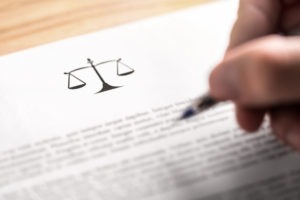
In California, some rules govern how evidence is treated in criminal cases. Penal Code 1538.5 refers to evidence suppression. When evidence is suppressed, it cannot be used against the defendant in court proceedings.
A criminal defense attorney will file a motion to suppress evidence, so it does not harm their client.
What Does California Penal Code 1538.5 PC Say?
Any tangible or intangible evidence obtained from a search or seizure without a warrant may be suppressed as evidence by a defendant in a motion for the return of property or suppression of evidence.
For a free legal consultation with a lawyer serving California, call (310) 896-2723
When Can I Request that Evidence Be Suppressed?
California law is specific about evidence-gathering procedures and what is admissible. When evidence is obtained illegally, it cannot be used against the defendant in court.
- If an illegal search produces the evidence, it makes the evidence inadmissible.
- If you were arrested without probable cause and obtained evidence was secured after you were charged, a motion to suppress would be appropriate.
- If there were no reason to suspect a crime and the officer gathered evidence during any part of an arrest, the evidence would have been illegally obtained, therefore, inadmissible in court.
Criminal Defense Lawyer Near Me (310) 896-2723
What Do Search and Seizure Mean?
You may grant a law enforcement officer permission to search your property. But, if you refuse to allow them to search your vehicle, home, or business, in most cases, a search warrant must be obtained by the police officer. Unless there is an emergency, in that case, there is no time to procure a search warrant, and the risks override the typical procedural formalities.
A warrant is unnecessary if there is evidence that the officer can see. For example, a bottle of liquor on the car’s seat would make it apparent that drinking and driving were probably taking place.
When authorities are in possession of a legally obtained search warrant, the property or specified parts of the property are made available to law enforcement officers to investigate. The police officers conducting the search are looking for evidence of a crime. Often, the search warrant specifies what evidence is to be gathered.
So, if they were searching for evidence to prove their case, such as a piece of stolen merchandise, and they were to find illegal drugs, the drug evidence should be suppressed.
Click to contact our Understanding California’s Penal Code today
What Are the Grounds for Suppressing Evidence?
California Penal Code Section 1538.5 protects defendants by allowing them to move to suppress evidence or have property returned to them if seized improperly. Here is what the code tells us about improper search and seizure.
- If no warrant was secured and the search or seizure was troublesome, this could necessitate a motion to suppress.
- If the warrant is insufficient on its face, the evidence obtained needs to be reviewed.
- Sometimes, authorities obtain a warrant through improper means. If there was no probable cause, the warrant should not have been issued.
- If the warrant describes evidence that the officers were supposed to be searching for but does not match what was obtained, this is cause to suppress.
- Methods of execution that violate constitutional standards may cause your criminal defense attorney to file a motion to suppress evidence.
Complete a Free Case Evaluation form now
What if My Case Is a Misdemeanor?
If you are arrested for a misdemeanor, motions to suppress evidence will be made at your arraignment. Though, new evidence introduced at trial may merit another suppression motion. You will not risk having harmful evidence submitted by calling a criminal defense attorney as soon as possible.
What Happens if My Case Is a Felony?
Your guilt or innocence hangs on the evidence. So, suppressing the evidence that would do you harm is imperative. Your criminal defense attorney can identify any reasons that evidence should be suppressed. They will handle pretrial suppression motions so that damning evidence is not used against you. A criminal defense lawyer can also pursue a suppression hearing during the trial if it is deemed appropriate.
To ensure your best possible outcome, the wrong evidence does not need to be used against you. Having an experienced set of eyes on the evidence and how it was seized is crucial. A criminal defense attorney will understand the penal codes and how they can be employed to benefit you.
When Does a Motion to Suppress Evidence Happen?
A 1538.5 motion typically happens before a trial begins. Your criminal defense attorney will file the motion before your trial goes to court. The decision concerning suppressed evidence will be rendered before the trial starts. This way, the evidence is not even presented and cannot affect your case.
Ensuring that both sides can argue the validity of the evidence in front of a judge but not in front of a jury is one of the benefits of this code. If it is suppressed, there will not have been an opportunity to sway the jury since it hasn’t been discussed.
What Happens at the Hearing?
At the hearing, both sides will be allowed to argue for or against the suppression of evidence. The judge will hear from any witnesses who might have been present. The defendant will also have a chance to tell their story. The police officers who were involved will give testimony under oath. The judge will hear their testimony and review it to aid in making their decision.
Both the prosecution and defense have a chance to question the people involved. Arguments will be made to the judge. Then, the judge will decide whether the motion should be granted or if there is insufficient evidence to grant it. In this case, the evidence is fair game to use against the defendant in court.
Sometimes, a portion of the evidence is excluded, but some are allowed into evidence for the trial.
Secure a Criminal Defense Attorney
A criminal defense attorney will know when to employ the 1538.5 motion to help his client. Winning a suppression motion can significantly weaken the case against you while strengthening your own. An experienced lawyer can keep the evidentiary deck from being stacked against you. Call today to start your motion to suppress.
Call or text (310) 896-2723 or complete a Free Case Evaluation form


